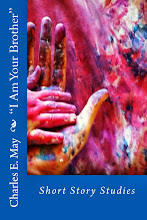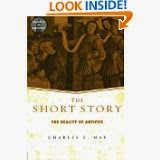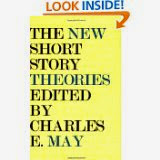Last year at the
Independent Bath Literature festival, Hanif Kureishi raised a bit of musty dust
by declaring that creative writing courses were a waste of time. Whether anyone
can teach another to be a "creative writer" is an old fuss and
doesn't interest me. The answer is, of course, both "yes" and
"no."
What most caught my eye in
the report of Kureishi's rant was his claim that students don't understand that
it's the story that really counts. "They worry about the writing and the
prose and you think: 'Fuck the prose, no one's going to read your book for the
writing, all they want to do is find out what happens in the story next.'"
Maybe Kureishi is right
about many novels that, eager to make money and get on to what happens next,
consist of piss-poor prose—but certainly not a real short story—at least a
short story that aims to be more than a mere time-passer on the bus or on the
pot.
I agree with George
Saunders, a much better short-story writer than Kureishi, who says that the
litmus test for him is always the language. In his essay, “Thank You, Esther
Forbes," Saunders says a
sentence is more than just a fact-conveyor; it also makes a certain sound, and
could have a thrilling quality of being over-full, saying more than its length
should permit it to say. A sequence of such sentences exploding in the brain
makes the invented world almost unbearably real. Saunders says, and I agree, by
honing the sentences you use to describe the world, you change the inflection
of your mind, which changes your perceptions.
To claim that all readers
that want to do is to find out what happens next shows a lack of respect for
the reader. I want to comment briefly today on a few stories in the 2011 Best British Short Stories that raise Kureishi's
"fuck the prose" condescension.
If you don't think
precision of language and a perfectly controlled and coherent tone is important
in a story; if you think plot is important or realism or raw emotion is important,
read Leone Ross's "Love Silk Food" and consider how language is the
key to a great story. Here is her opening sentence:
"Mrs. Neecy Brown's
husband is falling in love. She can tell because the love is stuck to the walls
of the house, making the wallpaper sticky, and it seeps into the calendar in
her kitchen, so bad that she can't see what the date is and the love keeps
ruining the food: whatever she does or however hard she concentrates,
everything turns to mush."
Outrageous metaphors work
if, when you really think about them, they have an irresistible logic. The
problem this story raises and solves is how to create the emotions of a woman
whose husband is cheating on her without making it a cliché, or sentimental, or
sad, or tedious. Language does it here.
For example, Mrs. Brown has six daughters, all born geometric in shape: cube,
heptagon, rectangle and two triangles so prickly "that she locked up shop
on Mr. Brown for nearly seven months. He was careful when he finally got back
in that their last daughter was a perfectly satisfactory and smooth-sided
sphere."
And if you want an example
of how a story weakens when the writer feels the necessity of plot, notice how
this story loses energy when the woman encounters a man who seems interested in
what she has to say and she finds herself in the role of the kind of
"excitement women" her husband chases. This reduction to plot does
not wreck the story, but it does make it limp a bit at the end.
Then there is Hilary
Mantel. I am not sure how revered Mantel is in England, although I suspect that
a two-time winner of the Booker for well-researched historical novels would
quite possibly be publicly adored. Good for her. But that doesn't mean she can write a decent short story. Although
I guess it would be hard to resist
including two stories by one of England's most respected novelists, I just
cannot see that either of her two stories in the 2001 Best British Short Stories are anything but dashed-off, plot-based,
pot-boilers.
The first thing that
distracts me about the story "Winter Break" is the use of novelistic
detail that has nothing to do with the significance of the story, just minor
observations to make the reader nod knowingly that the writer is most
perceptive. For example, when the couple arrive, the woman picks the cloth of
her T-shirt away from her back, prompting Mantel to observe: "We dress for
the weather we want, as if to bully it, even though we've seen the
forecast." Mantel then wisely notes that there are two types of taxi men:
the garrulous ones with a niece in Dagenham who want to talk and the ones who
"needed every grunt racked out of them" and wouldn't tell you where
their niece lived under torture. Again, the reader smiles wryly at such
perceptive observation.
The fact that Mantel notes
several times that the husband finds small children unbearable should alert us
that this is what the story is going to be about in some way. So it is no
surprise when the driver hits something, that the husband assumes, "kid."
When the driver picks up a rock and pounds on what he hit, the wife assumes it
is "Tomorrow's dinner". The story ends when the driver takes their
luggage out of the boot and the wife sees not a cloven hoof of an animal, but
the "grubby hand of a human child."
That, I suggest, makes
for a grubby little horror story.
Obviously, the dead child is a reminder to the woman of her husband's distaste
for children. And the cloven hoof reference is a "devilish" allusion. But what is this story about? Nothing, just poor prose and a plot that
shocks. Kureishi would probably like it.
Mantel's "Comma"
is a predictable childhood buddies, good girl/bad girl, poor girl/middle-class
girl story. In case we might miss that, Mantel announces it flatly in the
second paragraph as the girls ask each other if they are rich.
The most common convention
Mantel uses in the story is that of the fairy-tale, which she lays on so
heavily that she perhaps thinks we have never read one. The first-person
narrator announces that in a fairytale picture book you live in the forest
under dripping cables with a thatch roof, and you have a basket with a
patchwork cover with which you visit your grandma. When she says she is not
supposed to mention her friend Mary
Joplin's name, she images her as a two-dimensional character from a picture
book, "beaten thin and flat"—such a shadow-like figure that the
narrator is not sure if she even exists when she is not with her. These bookish
references culminate in the central metaphor of the mysterious creature shaped
like a comma. And then again, when the narrator relates the story of Mary's
mother who spat in a stew a woman brought to her and says if it were not the
persistence of the story, she might have thought she dreamed Mary and that time
has sprinkled the story with mercies like fairy dust.
Claire Massey's
"Feather Girls" is a better use of the fairy tale motif than
"Comma" precisely because of the restraint and control of the
language that makes it shimmer with significance rather than clamor with
cliché. The story is about an old mythic notion that women are somehow magical,
mysterious creatures that comes from a world of nature and myth and that
somehow men—who are merely men--must capture the creature and make it human by
stealing that aspect of it that binds it to the magical world. Mermaid stories
are such myths. John Sayles' film The Secret of Roan Innish, based on the
children's novel by Rosalie K. Fry, is about this legend. If it is not a selkie or seal whose skin is
taken away, then it is the feathers of a swan, as in Claire Massey's
story. The story works because of the
universality of the myth and Massey's restraint in framing it in the simplest
of situations of one man who always fails to be worthy of the feather girl he
desires.
Michele Roberts'
"Tristram and Isolde" raises another issue about the relationship of
language to plot. I had to read the story several times because I was not
really sure at first who the narrator is. The story sounds as if it is told by
a young woman with her lover, as he sighs to her, Izzy, my darling" and
she sleeps in his arms with her legs wrapped around him. He plunges his hands
into her "mop" of curls, telling her she has pointed ears like an
elf. When he eats meat, the smell from his body makes her feel a wolf is
hugging her. This metaphor is followed up by her knotting a pieces of string
around his wrist like a leash; he jumps up and down and growls, pawing her,
pretending to lick her nose.
The language is
insufferably adolescent: "Love, like sap, a green juice, coursed from his
heart down his arm through our joined hand sup my arm into my heart."
"This morning I felt I could eat the whole world, roll it on my tongue
crisp as pastry, tart and sweet as oranges."
When they walk in the
forest, branches are like the ears of deers pricking up and become transformed
into a red stag, his antlers like a "tall crown, candelabra of bone."
The stag is like a king of the woods, and she wants to fall down on the ground
and salute him. They come to an oak tree that has a hollow trunk—"our
secret room"—and she says it is like the chapter when Tristram and Isolde
run away and live in the forest secretly. She says to her herself that they are
married now. She says she is his real wife, the one he secretly loved best and
his other wife is far away where she could not see them.
The language is so thickly
adolescent that I find myself skimming, for it goes on and on repeating the
same kind of romantic fantasy. "We'd hold our breath when the searchers
cam past: they'd never guess what strange creatures nested" in the trees
and they were one single "creature of shared love." "Time stopped. The world broke in two
and the fragments flying apart hit me in the face, in the mouth, in the
teeth."
Then abruptly the fantasy
is broken when the man says "Look at the time" and she knows that
lovers have to part, especially secret lovers outlaw lovers. Then we find out what has been going on, for
on the bus she says he puts on a fake charming voice so all the old ladies
would think what a good father he is. "You want to see Mummy, don't you, Izzy
darling" And your new little brother."
Now we know it is a child
and she is jealous of the new baby as she kicks its cot. The story ends with a
final fantasy of escape as the child becomes invisible, leaps up to the
windowsill and flies out back to the green park, merging with the undergrowth,
dissolving to become her new true self, calling to her deer to surround her,
then vanishing with them into the "heart of the forest."
The problem the story
raises for me is that it deceives the reader into thinking one thing—that a
young woman is with her lover—and then "surprises the reader by letting us
know it is a female child fantasying
about her father. If you had known it was a child from the beginning, how would
you have reacted? If the only thing that makes the story a story is the plot trick,
is that enough to justify wading through the childish romanticism of the rest
of it, even if that romanticism is satire?
After all this talk about
plot vs. prose, I wonder if it is possible to like a story with ordinary prose
because of the compelling nature of the plot.
On the other hand, is it possible to like a story with an
inconsequential plot because it has very fine prose?
"Moving Day" by
Robert Edric is, for me, a story that has little plot interest, but I like the
sentences: "A fly flew across the small apartment and tapped against the
glass as though testing it for a flaw, searching for an escape."
"It was another
beginning—a time before the first ending, before the last decade—before the
upper floors had finally been abandoned to the heat and the dust and when the
inhabitants of the hightree apartments had congregated on the walled roof of
the tower."
And the concluding
paragraph:
"Proctor repeated the
names, mesmerized by what he'd retrieved, and this time, Miller joined him, the
two men word-and emphasis-perfect in their shared mantra, smiles on their
faces, their eyes closed, boys together, conducing themselves with the vague
and liquid movement of their fingers, and hearing somewhere in the room,
somewhere across the forty years which at once divided and connected them, the
muted time-keeping tapping of the solitary fly as it resumed its own
unstoppable journey into the light that had for so long remained beyond its reach."
"Looted" by Dai
Vaughan is a brief story about a soldier in World War II who takes a small
landscape painting from a shelled apartment. Many years later he sees a
photograph of the apartment with the painting visible. He surrenders the
painting to the German authorities and then begins trying to copy the painting
from memory. Then one day when his
eldest son takes him and his wife for a drive in the British countryside; he
sees a landscape that looks like the lost painting. The story ends with a
moment when he feels he must decide whether to enter the landscape or not. The complexity of this moment is whether by
entering the landscape he might delete the memory of the painting. He thinks
that by turning away he can allow the remembered painting to remain as it was,
but is not sure whether or not it is already too late. The last line is:
"He hesitates. And then his family
calls him to the car." Although the
prose is fairly transparent, the concept is intriguing, for it explores the
complex relationship between art and reality.
I will post one more brief
essay on issues raised for me by the remaining stories in Best British Short Stories 2011.





4 comments:
I have enjoyed your web blog. Nice blog. I will keep visiting this blog very often.
My monthly short story discussion group is discussing "plotless" stories next month. So far we've chosen, "Ghost and Empties" by Lauren Groff and "The Happy Day" by Antonya Nelson. Do you have suggestions for "plotless" short stories?
Hi, Keith, I have been thinking on your query about "plotless" stories. I am currently reading the 2015 O. Henry Prize Stories and think that Lydia Davis'story "The Seals," which appeared last year in The Paris Review, might qualify. It is largely a meditation about the loss of a sister.
I wish I could get a monthly short story discussion group going :(
But I did wish to note, referencing your reaction to Kureishi's statement , that a reader only cares about what happens next shows a lack of respect for the reader, that respect for actual readers is what is lacking in general with short stories. In my experience, the vast majority of short story writers (1) write for their peers in the writing and academic communities (a tiny subset of potential readers), (2) write them largely as warm-up or promotional devices for their novels (and publishers of collections reinforce this by requesting stories from big names with which to promote their collections, e.g., Hilary Mantel), or (3) write them strictly for sales (unabashedly genre stories).
I think quality short stories need to be reintroduced to the reading public as wonderful stand-alone experiences. I suspect I am preaching to the choir here (as you maintain one of the only sources of short story critique and reader enthusiasm). I'm trying to figure out how to do that here in St. Louis region.
Post a Comment